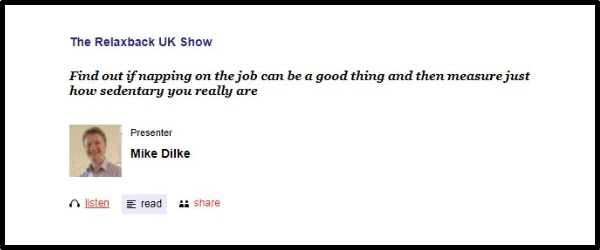Metronaps’ Founder on UK Health Radio
UK Health Radio presenter Mike Dilke interviews Metronaps’ founder Christopher Lindholst about why the NHS has chosen to implement nap pods in hospitals and why the sleep of health care workers is important to address. Listen to the episode right here:
Background
The British National Health Service (NHS) has installed several EnergyPods as well as other equipment such as Podtime pods for the benefit of their staff. This is in part due to a recommendation from the British Medical Association that all hospital facilities should have dedicated onboarding rooms. While this is not always possible due to space, nap pods such as the EnergyPod can be installed in practically any environment.
Alarming statistics
The increased focus on sleep within the NHS stems from alarming statistics about the consequences of sleep deprivation for caregivers and patients alike.
In particular, a survey which revealed that 2 in 5 doctors had fallen asleep behind the wheel on the way home following a 24-hour shift sparked incitement for developing solutions. Doctors falling asleep behind the wheel, however, are far from the only consequence of sleep-deprived health care workers:
- – 20.8% more medication errors occur during 24+ hour shifts
- – 5.6x more serious diagnostic errors are likely to be committed to during 24+ hour shifts (source above)
- – 44% of doctors suffer from depression and stress caused by their job
EnergyPods well received
The Royal Wolverhampton was the first NHS trust to install EnergyPods in 2018. Since then, several more NHS trusts have invested in EnergyPods. Dr. Sarb Clare from the Sandwell and West Birmingham Trust has given the following statement about the pods:
“The EnergyPods were a catalyst to a huge amount of wellbeing initiatives (…) Colleagues reported an improvement in concentration, mental state and felt safe to drive home after a night shift.“
We are very proud to serve the British health care system and hope to be able to work with more hospitals in the future.
Sources
Landrigan, C., Rothschild, J., Cronin, J., Kaushal, R., Burdick, E., & Katz, J. et al. (2004). Effect of Reducing Interns’ Work Hours on Serious Medical Errors in Intensive Care Units. New England Journal Of Medicine, 351(18), 1838-1848.
BMA (2020). Almost half of UK doctors suffering from burnout, depression or anxiety, BMA survey reveals.
Campbell, D. (2017). Half of junior doctors having accidents or near misses after night shifts. The Guardian.

